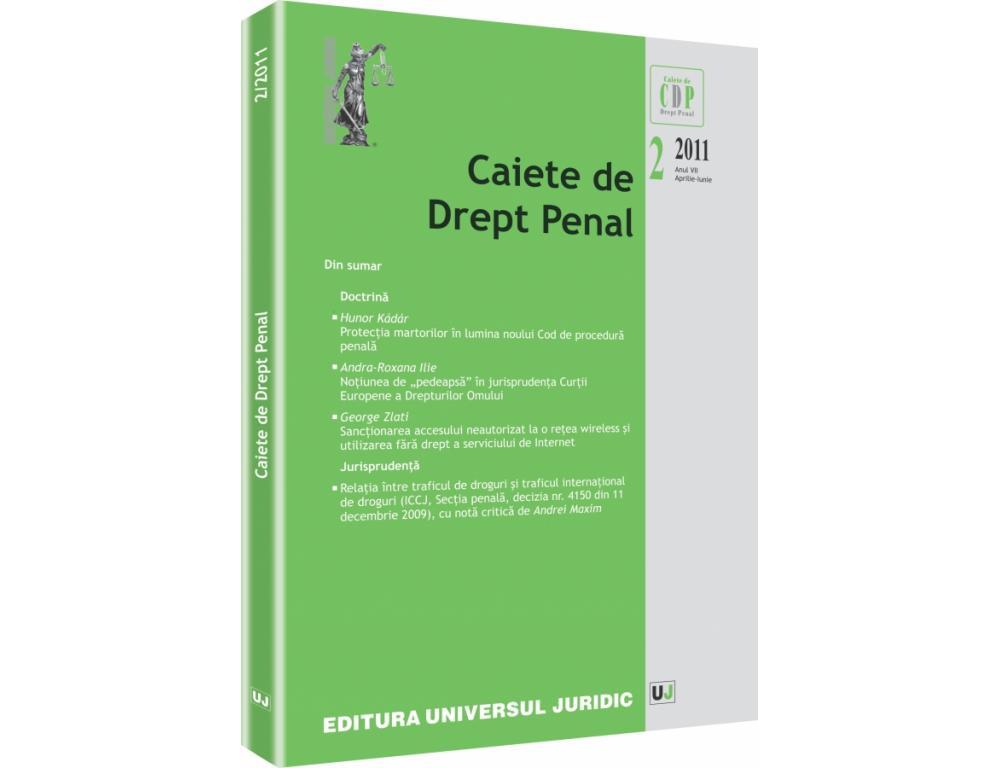Protectia martorilor în lumina noului Cod de procedura penala
Witness Protection in the New Code of Criminal Procedure
Author(s): Hunor KádárSubject(s): Law, Constitution, Jurisprudence, Civil Law
Published by: Universul Juridic
Keywords: New Code of Criminal Procedure; witness protection; Community acquis; ECHR case-law; „intimidated witnesses”; „vulnerable witnesses”; reasonable suspicion; protection measures; state of danger;
Summary/Abstract: The enforcement of Act no. 135/2010 representing the New Code of Criminal Procedure implied a complete reshaping of the provisions on witness protection. The new Code of Criminal Procedure consecrates a whole section to this new legal institution, entitled „Witness Protection”. Analysing the dispositions in the said section, it can be easily noticed that the Romanian legislator aimed at harmonising current procedural provisions with the Community acquis and the exigencies imposed by the ECHR case-law. First, it becomes visible that, unlike the current Code of Criminal Procedure, which fails to address the protection of vulnerable witnesses, the new Code distinguishes between two categories of witnesses that may need protection, namely the „intimidated witnesses” and the „vulnerable witnesses”. The latter category has undoubtedly been provided for out of the necessity to comply with the provisions set out in the Recommendation No. R (97) 13 issued by the Committee of Ministers of the Council of Europe. Additionally, the separation of witnesses that might need protection into two distinct categories is an advantage that allows the legislator to identify the protection measures and their application requirements, specific for each category of witnesses. As to the necessary protection conditions for the intimidated witnesses, the recent amendment by which the Code has excluded the requirement of evidence or probable cause, providing instead for the „existence of reasonable suspicion”, is least inspired. Moreover, in the case of vulnerable witnesses, the Code makes no mention as to the necessity for reasonable suspicion which might account for protection measures. Such omission of the legislator is a serious one, since it enables the conclusion that, in the case of vulnerable witnesses, it is presumed a state of danger that may threaten the psychical integrity of the former, therefore the legal text is in blatant opposition to the ECHR case-law. The new regulation provides for increased cautiousness as to the injured party and the party suing for civil injury, stating that these parties can benefit from the protection measures applicable to the intimidated witness or the vulnerable witness, if the case. Concerning the witness protection measures in the new Code of Criminal Procedure, there has been a spectacular change as to the special hearing proceedings. Thus, the new settlement abandons the mediated hearing, stipulated by art. 862 paras (1) and (2) in the Code of Criminal Procedure, allowing just for the hearing by audiovisual means as the only special hearing proceeding, which may ensure respect for the principles of contradictory debates and free assessment of evidence. By the new Code of Criminal Procedure, there has been instilled a new protection measure, i.e. exclusion of the public during the hearing of the witness. Such a new measure was necessary in order to correlate national procedural dispositions with those contained by the Recommendation No. R (97) 13. A particularly important issue that has not been solved by the new Code of Criminal Procedure concerns the possibility of the accused to challenge the alleged need for witness protection measures, a requirement expressly provide by the above-mentioned Recommendation. So, the new procedural dispositions do not provide the accused with a special verification procedure, within which the defence may have a proper opportunity to challenge the need for anonymity of the witness as well as to test the witness credibility. As to the evidentiary value of anonymous witness statements, the new provisions of the Code of Criminal Procedure have established that the court shall not consistently base its ruling upon the statement of the undercover investigator or the statements of protected witnesses, a requirement compelled by the ECHR case-law. Finally, it should be remarked that the new dispositions have addressed the obligation of the judicial authorities to draw the attention of the witness to the fact that he is entitled to protection measures. This legislative innovation is salutary, since it could end former practical habits of the judicial authorities who, in the absence of expressly stated rules, would not inform the witness about his right to protection.
Journal: Caiete de drept penal
- Issue Year: 2011
- Issue No: 02
- Page Range: 30-61
- Page Count: 32
- Language: Romanian
- Content File-PDF

